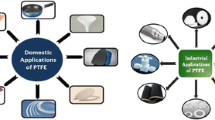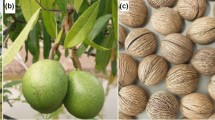Abstract
This work deals with the preparation of alkyd resins from neem oil and their utilization in preparation of polyurethane coatings. Alkyd resins were synthesized by reaction of neem oil monoglycerides with four different divalent acids like phthalic anhydride, maleic anhydride, itaconic acid, and dimer fatty acid. The alkyds formation was studied by determining the acid number of the reaction mixture at regular intervals of time and the extents of the polyesterification reactions were calculated during the formation of alkyds. The structures of synthesized alkyds were confirmed by FT-IR and 1H-NMR spectroscopic analysis and also by end group analysis such as hydroxyl and acid values. The synthesized alkyds were reacted with TDI to prepare PU coatings and their performance was compared with PU coatings prepared from a commercial alkyd.






Similar content being viewed by others
Abbreviations
- PU:
-
Polyurethane
- MG:
-
Monoglyceride
- TDI:
-
Toluene 2,4-diisocyanate
- DBTDL:
-
Dibutyltin dilaurate
- THF:
-
Tetrahydrofuran
- MS:
-
Mild steel
- FT-IR:
-
Fourier transform infrared
- 1H NMR:
-
Proton nuclear magnetic resonance
- TMS:
-
Tetramethyl silane
- CDCl3 :
-
Deuterated chloroform
References
Espinosa LM, Meier MAR (2011) Plant oils: the perfect renewable resource for polymer science. Eur Polym J 47:837–852
Gandini A (2008) Polymers from renewable resources: a challenge for the future of macromolecular materials. Macromolecules 41:9491–9504
Guner SF, Yagc Y, Erciyes TA (2006) Polymers from triglyceride oils. Prog Polym Sci 31:633–670
Pfister DP, Xia Y, Larock RC (2011) Recent advances in vegetable oil-based polyurethanes. Chem Sus Chem 4:703–717
Ronda JC, Lligadas G, Galia M, Cadiz V (2011) Vegetable oils as platform chemicals for polymer synthesis. Eur J Lipid Sci Technol 113:46–58
Guler OK, Guner FS, Erciyes AT (2004) Some empirical equations for oxypolymerization of linseed oil. Prog Org Coat 51:365–371
Meshram PD, Puri RG, Patil AL, Gite VV (2013) Synthesis and characterization of modified cottonseed oil based polyesteramide for coating applications. Prog Org Coat 76:1144–1150
Meshram PD, Puri RG, Patil AL, Gite VV (2013) High performance moisture cured poly (ether-urethane) amide coatings based on renewable resource (cottonseed oil). J Coat Technol Res 10:331–338
Yadav S, Zafar F, Hasnat A, Ahmad S (2009) Poly(urethane fatty amide) resin from linseed oil: a renewable resource. Prog Org Coat 64:27–32
Akintayo CO, Akintayo ET (2010) Studies on newly developed urethane modified polyetheramide coatings from Albizia benth oil. Adv Nat Appl Sci 4:210–220
Das B, Konwar U, Mandal M, Karak N (2013) Sunflower oil based biodegradable hyperbranched polyurethane as a thin film material. Ind Crops Prod 44:396–404
Jaliliana M, Yeganeha H, Haghighi MN (2010) Preparation and characterization of polyurethane electrical insulating coatings derived from novel soybean oil-based polyols. Polym Adv Technol 21:118–127
Mutlu H, Meier MAR (2010) Castor oil as a renewable resource for the chemical industry. Eur J Lipid Sci Technol 112:10–30
Shende PG, Dabhade SB, Phalke YD (2004) Preparation and characterization of linseed oil modified polyesteramide resins for surface coatings. Pigm Resin Technol 33:85–90
Tan SG, Chow WS (2010) Biobased epoxidized vegetable oils and its greener epoxy blends: a review. Polym Plast Technol Eng 49:1581–1590
Bora MM, Gogoi P, Deka DC, Kakatia DK (2014) Synthesis and characterization of yellow oleander (Thevetia peruviana) seed oil-based alkyd resin. Ind Crops Prod 52:721–728
Nimbalkar RV, Athawale VD (2010) Synthesis and characterization of canola oil alkyd resins based on novel acrylic monomer (ATBS). J Am Oil Chem Soc 87:947–954
Elodie H, Albin T, Michel B, Luc A (2011) Accelerated artificial ageing of new dimer fatty acid based polyamides. Polym Degrad Stab 96:1097–1103
Alam M, Alandis NM (2011) Microwave assisted synthesis of urethane modified polyesteramide coatings from jatropha seed oil. J Polym Environ 19:784–792
Chaudhari AB, Anand A, Rajput SD, Kulkarni RD, Gite VV (2013) Synthesis, characterization and application of Azadirachta indica Juss (neem oil) fatty amides (AIJFA) based polyurethanes coatings: a renewable novel approach. Prog Org Coat 76:1779–1785
Chaudhari AB, Kuwar AS, Mahulikar PP, Hundiwale DG, Kulkarni RD, Gite VV (2014) Development of Anticorrosive two pack polyurethane coatings based on modified fatty amide of Azadirachta Indica Juss oil cured at room temperature—a sustainable resource. RSC Adv 4:17866–17872
Chaudhari AB, Rajput SD, Mahulikar PP, Kulkarni RD, Gite VV (2013) Development of eco-friendly polyurethane coatings based on neem oil polyetheramide. Ind Crops Prod 50:550–556
Chaudhari AB, Tatiya PD, Hedaoo RK, Kulkarni RD, Gite VV (2013) Polyurethane prepared from neem oil polyesteramides for self healing anticorrosive coatings. Ind Eng Chem Res 52:10189–10197
Felizardo P, Machado J, Vergueiro D, Correia MJN, Gomes JFP, Bordado JM (2011) Study on the glycerolysis reaction of high free fatty acid oils for use as biodiesel feedstock. Fuel Process Technol 92:1225–1229
Borjesson IE, Harrod M (1999) Synthesis of monoglycerides by glycerolysis of rapeseed oil using immobilized lipase. J Am Oil Chem Soc 76:701–707
Akintayo CO, Adebowale KO (2004) Synthesis and characterization of acrylated Albizia Benth medium oil alkyds. Prog Org Coat 50:207–212
Ataei S, Yahya R, Gan SN (2011) Palm oleic acid based alkyds: effect of the fatty acid content on the polyesterification kinetics. J Polym Environ 19:540–545
Oladipo GO, Eromosele IC, Folarin OM (2013) Formation and characterization of paint based on alkyd resin derivative of Ximenia americana (wild olive) seed oil. Environ Nat Res Res 3:52–62
Rajput SD, Mahulikar PP, Gite VV (2014) Bio-based dimer fatty acid containing two pack polyurethane for wood finished coatings. Prog Org Coat 77:38–46
Rajput SD, Gite VV, Mahulikar PP, Thamke VR, Kodam KM, Kuwar AS (2014) Renewable source based non-biodegradable polyurethane coatings from polyesteramide prepared in one-pot using oleic acid. J Am Oil Chem Soc 91:1055–1063
Jiao L, Xiao H, Wang Q, Sun J (2013) Thermal degradation characteristics of rigid polyurethane foam and the volatile products analysis with TG-FTIR-MS. Polym Degrad Stab 10:2687–2696
Hojabri L, Kong X, Narine SS (2009) Fatty acid-derived diisocyanate and biobased polyurethane produced from vegetable oil: synthesis. Polymer Charact Biomacromolecules 10:884–891
Bora MM, Deka R, Ahmed N, Kakati DK (2014) Karanja (Millettia pinnata (L.) Panigrahi) seed oil as a renewable raw material for the synthesis of alkyd resin. Ind Crops Prod 61:106–114
Acknowledgments
The authors are thankful to a National Research Foundation of Korea (NFR: 2012M2A2A6035933) grant funded by the Korean government. The authors are also grateful to the University Grants Commission (UGC), Govt. of India, New Delhi for providing financial support.
Author information
Authors and Affiliations
Corresponding authors
About this article
Cite this article
Chaudhari, A., Kulkarni, R., Mahulikar, P. et al. Development of PU Coatings from Neem Oil Based Alkyds Prepared by the Monoglyceride Route. J Am Oil Chem Soc 92, 733–741 (2015). https://doi.org/10.1007/s11746-015-2642-3
Received:
Revised:
Accepted:
Published:
Issue Date:
DOI: https://doi.org/10.1007/s11746-015-2642-3




